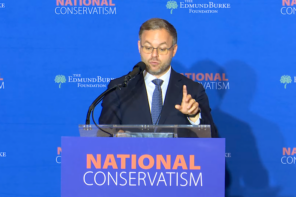Remember that 9-foot bronze statue of Baphomet the Satanic Temple (TST) built? On August 16, it will be loaded onto a truck and driven from Salem, Massachusetts, to Little Rock, Arkansas, where it will be the focus of an interfaith rally for religious liberty.
This move is part of an ongoing three-year controversy involving TST, the American Civil Liberties Union (ACLU), and the Arkansas legislature over a Ten Commandments monument currently installed at the Arkansas Capitol. The rally probably won’t affect the outcome of the lawsuit, but it might help to reframe the debate about religious liberty and the separation of church and state.
The trouble started in 2015 when Arkansas state Sen. Jason Rapert sponsored a bill to erect a Ten Commandments monument at the Capitol. Instead of having the taxpayers fund the monument, it was sponsored by a nonprofit Rapert created called “The American Heritage and History Foundation” (AHHF). (Rapert is also founder and president of Holy Ghost Ministries, a religious nonprofit, and it’s still unclear whether there’s a financial relationship between the two groups.)
AHHF is nominally dedicated to “informing the public about American history and heritage” and Rapert’s bill states:
The placing of a monument to the Ten Commandments on the grounds of the Arkansas State Capitol would help the people of the United States and of the State of Arkansas to know the Ten Commandments as the moral foundation of the law.
This isn’t preserving American history so much as rewriting it. As noted by Oklahoma Supreme Court justice Steven Taylor when a nearly identical bill and monument were declared unconstitutional in that state, the Ten Commandments are not mentioned in the Federalist Papers, The Declaration of Independence, or the Constitution. Nor were they mentioned during the Philadelphia Constitutional Convention, and they have never been invoked by the Supreme Court as a source of law. In fact, American prohibitions against murder, theft, and perjury (which are congruent with the Ten Commandments) come from English law, which has been traced back to Germanic tribes from before they were Christianized.
This “history” lesson seems to be little more than camouflage for the monument’s real purpose. Even though Rapert’s bill specifies that the monument “shall not be construed to mean that the State of Arkansas favors any particular religion or denomination over others,” its most obvious function is to mark the Capitol as an explicitly Christian space.
TST intervened as they did in Oklahoma by offering to erect their statue of Baphomet next to the Rapert’s monument so as to create a message of religious pluralism rather than religious monopoly. In October 2016, TST’s Lucien Greaves travelled to Little Rock and attended a meeting of the Arkansas State Capitol Arts and Grounds Commission to discuss bringing Baphomet to the capitol. The commission treated the proposal seriously and actually discussed possible locations on capitol grounds where Baphomet might be installed.
A public hearing for further discussion of the monument was scheduled for May 2017. But in February, TST was informed that their hearing was cancelled because of a new bill—which Rapert co-sponsored and later became law—decreeing that the legislature must first approve any monument proposals before they can be considered by the Arts and Grounds Commission.
The bill even featured a clause declaring the situation to be an emergency and stating the law would go into immediate effect because it was “necessary for the preservation of public peace, health, and safety.” In fact, it was applied retroactively to TST’s proposal. In response, Stuart de Haan, an attorney for TST, sent a letter to the deputy secretary of state arguing that applying laws retroactively against one group is a clear case of religious discrimination.
Undaunted, the legislature installed the Ten Commandments monument on June 27, 2017. But less than 24 hours later, Arkansas resident Michael Tate Reed allegedly rammed it with his car. (He had previously destroyed a similar monument in Oklahoma.) Reed, who suffers from mental illness and describes himself as a “Jesus freak,” explained he did this to defend the separation of church of state. In response, TST postponed their lawsuit. Since constructing Baphomet, they have been clear that it may only be placed next to and never instead of a Christian monument.
Rapert’s nonprofit paid for a second Ten Commandments monument, aided by a large donation from Pure Flix—the Christian film company that produced the God’s Not Dead franchise. On April 26, 2018, the new monument went up, this time with concrete barriers to deter car attacks. This triggered lawsuits from the ACLU, the Freedom from Religion Foundation, and similar groups. TST sued as well and filed an “intervenor,” that would merge their case with other suits against the monument. Arkansas Secretary of State Mark Martin has objected to the intervenor, claiming TST is not a “legitimate religion” but “a front.” (Significantly, Martin’s 22-page document never defines what a “legitimate religion” is.)
So what does all of this have to do with Satanists holding a rally for religious freedom? Well, Rapert has a habit of framing Christians as an embattled minority and his opponents as intolerant opponents of religious freedom. When his hometown of Conway, Arkansas, had its 12th annual gay pride parade, he called it one of the most “offensive public displays against Christians” and an attempt to “intimidate people who believe in the word of God.”
This strategy of framing oneself as “for” religious freedom and opponents as “against” God and Christianity is one TST has encountered numerous times. When they put up a holiday display in Lansing, Michigan, Bill Donohue, president of the Catholic League, said Satanists “hate Christianity” and “lie for a living.” A critic of their After School Satan Club opined that TST’s leaders “simply hate God.” When asked whether TST “hates God,” Greaves answered, “No, that’s what they want this to be about.”
This time, TST is attempting to demonstrate that they are for something and that it’s their opponents who don’t like religious freedom. Greaves explained, “The notion that we’re the ones trying to deny people their religious freedom is massively hypocritical. We can’t allow America to be redefined as a theocracy.” All of this comes in the wake of U.S. Attorney General Jeff Sessions’ announcement of a “religious liberty task force,” which Louise Melling of the ACLU accused of “turning that understanding of religious freedom on its head.”
The rally will have speakers of different faiths, including at least one Protestant minister. People from around the nation are already making plans to attend. It will also cost $20,000, which TST has already raised. Much of that sum is for a security detail to ensure the safety of everyone present.
When I asked Greaves if he really thought bringing a Satanic statue to Little Rock was a good idea, he replied, “I have faith we can pull this off.”




